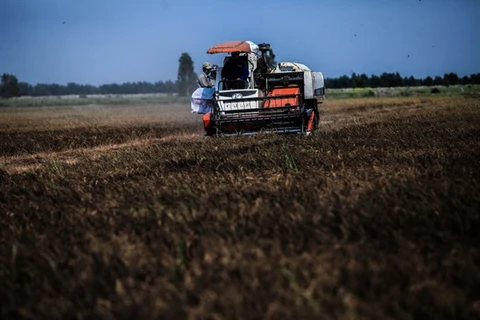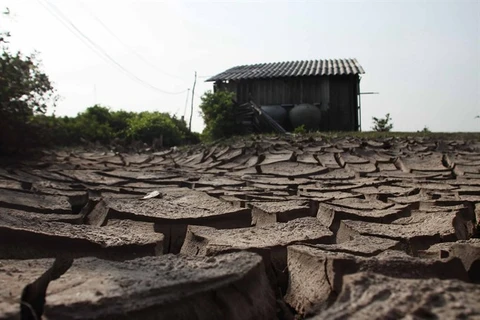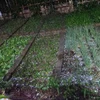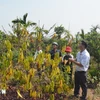 Farmers work at a local field damaged by recent torrential rains in Hau Giang Province’s Vi Trung Commune (Photo: VNA)
Farmers work at a local field damaged by recent torrential rains in Hau Giang Province’s Vi Trung Commune (Photo: VNA) In Hau Giang province, heavy rains on February 2 inundated a large area of paddy that was close to harvest time in Chau Thanh A and Vi Thuy districts, forcing their owners to spend large sums of money pumping the water out.
More than 2,400ha of ripening winter-spring rice crop in Can Tho city were damaged.
In some areas where farmers had started their harvest, the rains caused difficulties for them in reaping and drying the paddy.
Tran Van An, deputy chairman of the People’s Committee of Phuoc Long district in Bac Lieu province, said the rains have damaged 1,000ha out of 9,000ha of rice in his locality, affecting productivity and quality.
The rains also caused heavy losses to salt producers in Bac Lieu, the largest producer in the delta.
Nguyen Hoang Thua, deputy chairman of the Salt Production Cooperative in Doanh Dien hamlet, said, “We could not harvest our salt because there has been a lot of rain since the beginning of the season."
Usually the salt harvest would have been completed a month ago, but the unseasonable rains have put paid to that this year, he said.
Salt prices are up almost 250 percent from a year ago, but producers do not have stocks to sell.
Nguyen Van Tranh, deputy director of the Ca Mau Province Department of Agriculture and Rural Development, said nearly 3,400ha of paddy ready for harvest were damaged by the rains.
Green bean growers in the province’s Khanh Binh Tay commune have also suffered heavy losses since the young trees were extremely vulnerable to water, Doan Chi Tam, chairman of the communal People’s Committee, said.
Fruit growers in Tien Giang, Vinh Long, Ben Tre, Hau Giang, Can Tho and other localities are also suffering because of the downpours.
Many mango, rambutan and durian gardens are flowering, but the heavy rains have caused the flowers to shed, affecting output, according to fruit growers.
Le Thanh Hai, deputy general director of the National Centre for Hydro-meteorological Forecasting, said the rains were caused by a strong equatorial convergence zone, with the heaviest rainfall occurring on February 2.
Le Thi Xuan Lan, a meteorologist, said unseasonable rains alternating with sunny weather would continue to occur in the south, but this would gradually end by the end of this month.
The dry season would then last from March until the end of April, she said. Last year, the dry season had lasted a whole six months.
However, rainfall this year could be lower than the average of the last several years, and the Mekong River is expected to be 15-30 percent lower than the average flow of several years, equivalent to the dry season of 2014–15 and a bit higher than last year.
Saltwater could intrude into the region earlier and last longer than in previous years, though the severity will not match the drought of 2015–16.
Mekong provinces have begun to take measures to counteract the drought and salinity.-VNA
VNA























